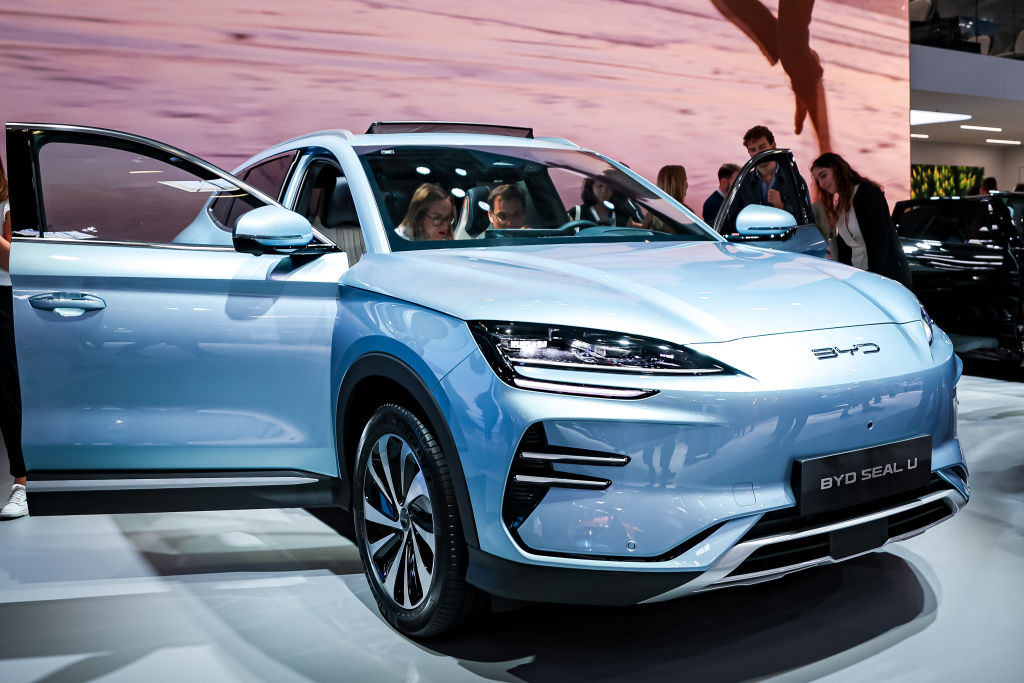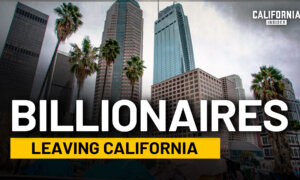Commentary
Like electric cars crashing on the 5 Freeway, U.S. and California policies are smashing into each other—clearing the way for the policies of the Chinese Communist Party. California’s mandate for new vehicle sales by 2035 to be 100 percent electric needs the maximum production of electric cars at the lowest price to get them out on the road.
In addition, to push sales, the federal government grants a $7,500 tax credit. But last year, according to new rules on income posted the IRS’s website on Nov. 28, recipients’ income may not exceed:
- $300,000 for married couples filing jointly
- $225,000 for heads of households
- $150,000 for all other filers
But rich people are mainly the ones buying these cars. And in California, a $150,000 salary doesn’t allow you to even buy a house in which to put a home-charging station. Because the median family
income needed to buy a home in this state is $208,000.
And as of Jan. 1, the federal government ended the rebate for electric vehicles made in China. So the $160,000 BYD Yangwang U8 Gov. Gavin Newsom enthused about during his junket to China last year would not qualify for the $7,500 rebate. But again, the rich people buying such cars wouldn’t have qualified anyway. And they can still afford it even without the rebate—especially the cheaper models BYD has become known for.
I wrote in The Epoch Times, “An Oct. 24 Global Times article confirmed my view that Mr. Newsom’s visit to a BYD factory made him ‘Communist China’s Greatest Salesman.’ ... After learning about bus electrification in Shenzhen and taking a test ride in a sport utility vehicle made by Chinese electric carmaker BYD, the governor said ‘he wants to have two of them,’ according to local media reports.”
China’s BYD Tops Tesla
Meanwhile, check out this
headline on the front page of the printed Jan. 3 Financial Times (FT): “China’s BYD takes Tesla’s spot as world’s biggest electric car maker: US group posts fewer quarterly sales; Price cuts spur rival; Consumers shift to cheaper vehicles.”
The story: “The US group handed over 484,000 cars in the fourth quarter, more than the 473,000 anticipated by analysts but not enough to hold on to its title after BYD reported record sales of battery-only vehicles of 526,000 for the same period.
“Tesla’s dethroning by BYD reflects the rise of what was a little-known Chinese group only a decade ago, which Musk himself has publicly dismissed. While growth at the Warren Buffett-backed Chinese company has been mostly achieved on its home turf, BYD is sharpening its focus on finding new foreign markets including in Europe.
“Danni Hewson, head of financial analysis at AJ Bell, said BYD’s electric cars were ‘becoming increasingly visible on European roads thanks to keen pricing.’”
Notice a big winner here is super-investor Warren Buffett: “The Chinese group’s early success prompted Buffett’s Berkshire Hathaway to invest in the company in 2008. Despite relying on existing industry technology for many years, BYD has focused on stripping out costs from the production process.”
This shows how Mr. Buffett became the world’s most successful investor by closely monitoring government policies, here and abroad. He saw how California and other states were pushing electric vehicle mandates, then invested in a Chinese company making cheaper models.
It was of no concern to him that BYD, like all major Chinese companies, was tightly linked to the Chinese Communist Party (CCP). FT reported, “Following years of state support and careful industrial planning by Beijing”—that is, by the CCP—“China’s automakers now leverage their country’s control over the production of almost every resource, material and component used to make electric vehicles.”
Last May, I reported in The Epoch Times, “California Zero-Carbon Mandates Boost China’s Control of Cobalt.” I based that on a new book, “Cobalt Red: How the Blood of the Congo Powers Our Lives,” by Siddharth Kara. And I noted the book detailed numerous human rights abuses of the miners.
The Rise of State Capitalism
What’s going on was described in a 2016 book, “
State Capitalism: How the Return of Statism is Transforming the World,” by
Joshua Kurlantzick. State capitalism combines elements of government ownership and control with competing in global markets. For example, BYD and other companies controlled by the CCP sell their products on the world market; therefore, they have to meet the needs of global customers. That means there are profits—which go to the party and its top members.
According to Mr. Kurlantzick, state capitalism is “more protectionist, more dangerous to global security and prosperity, and more threatening to political freedom” than free market economies.
“The most serious threat from state capitalism is that the two big state capitalist authoritarian powers, China and Russia, will use their state companies as weapons in conflicts with other countries, as vehicles to control certain types of natural resources, as vehicles for obtaining and stealing sensitive technology from other nations, or as tools for undermining environmental and labor norms in countries where their state companies invest.”
US, California Policies Boost State Capitalism
Unfortunately, the U.S. and California polices boost state capitalism, both here and abroad. We have few industries directly owned by the government, such as the U.S. Postal Service or the California High-Speed Rail Authority. But we do have direct state manipulation of markets, in particular the huge vehicle industry.
Without the mandates and subsidies, the EV industry in America, especially California, would be a lot smaller than it is today. That would have given less impetus to the growth of the EV industry, including BYD and other companies in communist China.
Another aspect of state capitalism is using industry to the benefit of politically connected investors. Berkshire Hathaway long has been a major contributor to both political parties. According to OpenSecrets.org, it made $3.9 million in contributions in the 2022 election cycle. And in 2021, lobbying spending was $5.8 million. Top recipients were Republicans:
- $224,762 to the National Republican Congressional Committee
- $207,500 to GOPAC
- $159,024 to the National Republican Senatorial Committee
- $87,897 to the Republican National Committee
However, Mr. Buffett’s personal main
contributions went to Democrats:
- $248,500 to the Democratic Congressional Committee in 2019
- $33,900 to the Democratic Senatorial Campaign Committee in 2018
- $5,600 to Sen. Mark Kelly of Arizona in 2018
- $2,700 to Rep. Donna Shalala of Florida in 2018
Chinese Socialism
After Chairman Mao died in 1976, under Deng Xiaoping, China moved from hard-core Maoist central planning to what Deng called “socialism with Chinese characteristics.” It seemed a contradiction because markets were introduced and the country apparently was moving toward U.S.-style free markets. But now we know what was meant: state capitalism.
In Soviet days, anti-communists like me used to cite a maxim attributed to Lenin, the first Soviet dictator: “When it comes time to hang the capitalists, they will vie with each other for the rope contract.”
Today, with the colliding U.S. and California policies on EVs helping communist China, the rope will be delivered in a BYD Yangwang U8 driven by Gavin Newsom.









